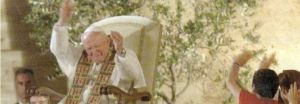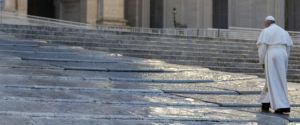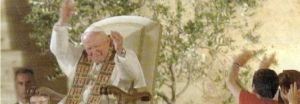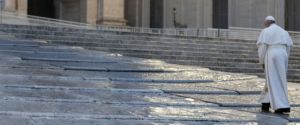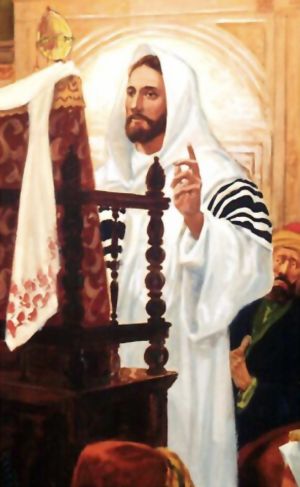
don Giuseppe Nespeca
Giuseppe Nespeca è architetto e sacerdote. Cultore della Sacra scrittura è autore della raccolta "Due Fuochi due Vie - Religione e Fede, Vangeli e Tao"; coautore del libro "Dialogo e Solstizio".
Under His Lordship
"Heaven and earth will pass away, but my words will not pass away" (Mk 13: 31). Let us pause a moment to reflect on this prophecy of Christ.
The expression "Heaven and earth" recurs frequently in the Bible in reference to the whole universe, the entire cosmos. Jesus declares that all this is destined to "pass away"; not only the earth but also Heaven, which here is meant in a purely cosmic sense and not as synonymous with God. Sacred Scripture knows no ambiguity: all Creation is marked by finitude, including the elements divinized by ancient mythologies; there is no confusion between Creation and the Creator but rather a decided difference. With this clear distinction Jesus says that his words "will not pass away", that is to say they are part of God and therefore eternal. Even if they were spoken in the concreteness of his earthly existence, they are prophetic words par excellence, as Jesus affirms elsewhere, addressing the heavenly Father: "I have given them the words which you gave me, and they have received them and know in truth that I came from you; and they have believed that you sent me" (Jn 17: 8). In a well-known parable Christ compares himself to the sower and explains that the seed is the word (cf. Mk 4: 14); those who hear it, accept it and bear fruit (cf. Mk 4: 20) take part in the Kingdom of God, that is, they live under his lordship. They remain in the world, but are no longer of the world. They bear within them a seed of eternity a principle of transformation that is already manifest now in a good life, enlivened by charity, and that in the end will produce the resurrection of the flesh. This is the power of Christ's word.
[Pope Benedict, Angelus 15 November 2009]
The greatest and truest sowing
5. "Behold, the sower went out to sow" (Mt 13:3).
The Incarnation of the Word is the greatest and truest "sowing" of the Father. At the end of time the reaping will take place: man will then be subjected to God's judgement. Having received much, he will be asked to account for much.
Man is responsible not only for himself, but also for other creatures. He is so in a global sense: their fate is linked to him in time and beyond time. If he obeys the Creator's design and conforms to it, he leads the whole of creation into the realm of freedom, just as he dragged it with him into the realm of corruption because of original disobedience. This is what St Paul intended to tell us today in the Second Reading.
A mysterious speech, his, but a fascinating one. By accepting Christ, humanity is able to inject a flow of new life into creation. Without Christ, the cosmos itself pays the consequences of human refusal to freely adhere to the plan of divine salvation. For the hope of us and of all creatures, Christ has sown in the human heart a germ of new and immortal life. A seed of salvation that gives creation a new orientation: the glory of the Kingdom of God.
[Pope John Paul II, homily at S. Stefano di Cadore, 11 July 1993]
Looking inside us
When Jesus spoke, he used simple words and he also used images which were examples taken from daily life, in order to be easily understood by all. This is why they listened to him willingly and appreciated his message which directly touched their heart. And it was not that complicated language which was difficult to understand, as that used by the Doctors of the Law of that time, which was not easily understood, was very rigid and distanced people. And with this language Jesus made the mystery of the Kingdom of God understood; it was not complicated theology. And one example is that of today’s Gospel passage: the parable of the sower (cf. Mt 13:1-23).
The sower is Jesus. With this image, we can see that he presents himself as one who does not impose himself, but rather offers himself. He does not attract us by conquering us, but by donating himself: he casts seeds. With patience and generosity, he spreads his Word, which is not a cage or a trap, but a seed which can bear fruit. And how can it bear fruit? If we welcome it.
Therefore, the parable concerns us especially. In fact, it speaks more of the soil than of the sower. Jesus carries out, so to speak, a “spiritual X-ray” of our heart, which is the soil on which the seed of the Word falls. Our heart, like the soil, may be good and then the Word bears fruit — and a great deal — but it can also be hard and impermeable. This happens when we hear the Word but it bounces off of us, just as on a street: it does not enter.
Between the good soil and the street; the asphalt — if we throw a seed on the “sanpietrini” (cobblestones), nothing grows — there are however, two intermediate types of soil which, in different amounts, we can have within us. The first, Jesus says, is rocky. Let us try to imagine it: rocky ground is a terrain that “does not have much soil” (cf. Mt 13:5), so the seed sprouts but is unable to put down deep roots. This is how the superficial heart is: it welcomes the Lord, wants to pray, love and bear witness, but does not persevere; it becomes tired and never “takes off”. It is a heart without depth, where the rocks of laziness prevail over the good soil, where love is fickle and fleeting. But whoever welcomes the Lord only when they want to does not bear fruit.
Then, there is the last ground, the thorny one, filled with briars which choke the good plants. What do these thorns represent? “The cares of the world and the delight in riches” (v. 22), as Jesus says explicitly. The thorns are the vices which come to blows with God, which choke his presence: above all these are the idols of worldly wealth, living avidly, for oneself, for possessions and for power. If we cultivate these thorns, we choke God’s growth within us. Each of us can recognize his or her big or small thorns, the vices that inhabit the heart, those more or less deeply rooted briars that God does not like and that prevent us from having a clean heart. It is necessary to tear them out, otherwise the Word cannot bear fruit, the seed will not grow.
Dear brothers and sisters, Jesus invites us today to look inside ourselves: to give thanks for our good soil and to tend the soil that is not yet good. Let us ask ourselves if our heart is open to welcome the seed of the Word of God with faith. Let us ask ourselves if our rocks of laziness are still numerous and large; let us identify our thorns of vice and call them by name. Let us find the courage to reclaim the soil, to effect a nice conversion of our heart, bringing to the Lord in Confession and in prayer our rocks and our thorns. In doing this, Jesus, the Good Sower will be glad to carry out an additional task: purify our hearts by removing the rocks and the thorns which choke his Word.
May the Mother of God, whom we remember today with the title of Blessed Virgin of Mount Carmel, unparalleled in welcoming the Word of God and putting it into practice (cf. Lk 8:21), help us to purify our hearts and welcome the Lord’s presence there.
[Pope Francis, Angelus 16 July 2017]
How to rebuild the Temple?
The Lord wants new people, who listen
(Mc 3,31-35)
In the life of those who are challenged by the relationship of Faith, to become blood relatives of the Father (according to the Spirit) is fundamental Perceive [in profound sense of Listening - not so much materially ‘seeing’].
It’s not worth the «staying outside», or wanting to ‘speak’ directly, to ‘convince’ the Lord (vv.31-32).
It is necessary to intuit and grasp: a path to encounter one’s own intimate layers of being, the truth of inclinations, and of life.
It’s decisive to welcome a satiating Word, which becomes language and culture, which has creative power: given to the ears and discovered inside. Captured in personal history and reality, and transmitted again.
To depart from this founding Core and Eros means detaching from oneself, dispersing oneself in rivulets that do not belong to us, failing into the void [’emptiness’ not understood as a deep energetic state, which prepares new developments].
Paradoxically, both our Freedom and the Salvation of the world are the result of an Obedience - but not external, or others.
It is rather tuning in to the part of the Logos within us that is blooming; really "perfect". No conditioning model.
No a priori correction, nor forcing according to prejudice: rather, an eternal Metamorphosis - accompanied by the Verbum Domini, which mysteriously guides Exodus into Exodus.
No culturally configured expectation would lead to full communion with the great divine spark and fullness in each and every one.
Realisation of the Kingdom and every day - even outside of time.
To know Christ closely it’s not enough to look at him and be taken by sympathy, cultural ties, or religious emotion.
It is the Listening that connects and establishes intimate constraints which do not extinguish - a friendship of engaging harmony with the Master.
Around Jesus the Word of God creates a new Family, with bonds of spiritual kinship closer than what the clan attachment offered.
The Lord wants other people, born precisely from Perception-forebonding.
The union is no longer reserved and exclusive; it becomes accessible to anyone - in any condition - even if he/her were "blind" outside, unable to see what is at hand.
Each one is Church, the Father's House, and thus can realize God's Dream of living with men and walking beside them.
He dwells among us and in us. In his Word, without more ‘distances’.
In this way, all our actions must aim for this purpose: to form the Temple of God, his lineage, the Body of the living Christ.
To achieve this complete goal, essential means is to host the Vocation that transforms us, a much more permanent, sensitive and energetic foundation of any feeling, connection, or emotion.
Indispensable is not an (initial) experience of enthusiasm, but the custody of the Call that interprets life and becomes mentality, dynamism inside that leads [and flows into suburban paths].
There is yet other Temple to be built.
[Tuesday 3rd wk. in O.T. January 27, 2026]
How to rebuild the Temple?
The Lord wants new people, who listen
(Mk 3:31-35)
In the life of one who is challenged by the relationship of Faith, in order to become consanguineous with the Father according to the Spirit, it is essential to become a disciple, not to "stand outside" (vv.31-32).
We are called to Perceive, in the profound sense of Listening - not so much materially "seeing" in a direct way, and then "convincing" the Lord.
It is necessary to perceive and grasp: a path to encounter one's own deep layers of being, the truth of inclinations, and of life.
It is decisive to welcome a satiating Word, which becomes language and culture, which has creative power: given to the ears and discovered within. Captured in personal history and reality, and transmitted again.
To turn away from such a founding Word and Eros is to detach oneself from oneself, to disperse into rivulets that do not belong to us, to plunge into emptiness ['emptiness' not understood as a deep energetic state, which prepares new developments].
Paradoxically, both our Freedom and the Salvation of the world are the result of Obedience - but not external, or others'.
Rather, it is tuning in to the part of the Logos within us that is blossoming; truly 'perfect'. No conditioning models.
No a priori correction, no forcing according to prejudice: rather, an eternal Metamorphosis - accompanied by the Word, mysteriously leading from Exodus to Exodus.
No configured "cultural" expectation would lead to full communion with the great divine spark and fullness in each and all.
Realisation of the Kingdom and every day - even outside of time.
To know Christ, it is not enough to look at him outwardly and get caught up in sympathy or religious emotion.
It is the Listening, the habit of life, the involvement, that establish and intimate bonds of authentic harmony with the Master.
A new family is created around Jesus, with bonds of spiritual kinship that are stronger than what the narrow bonds of kinship offered.
The Lord wants other people, born precisely from Perception-presence.
The union is no longer reserved and exclusive; it becomes accessible to anyone and in whatever condition they find themselves - even if they are outwardly "blind", unable to see what is at hand.
Everyone is Church, the Father's House, and thus can realise God's Dream of dwelling with men and walking beside them.
He dwells among us and in us. In his Word, with no more "distance".
In this way, all our actions must tend towards this goal: to form the Temple of God, his household, the Body of the living Christ.
To reach this accomplished goal, an essential means is to host the Vocation that transforms us, a foundation much deeper than any bond or emotion.
Indispensable is not an (initial) experience of enthusiasm, but rather the hosting of the Call that interprets life and becomes a mentality, a dynamism within that guides and flows into peripheral paths.
In ancient Israel, the basis of social coexistence was the large family. Clans and communities were a guarantee of protection of both particular hearths and people.
That bond of real solidarity ensured possession of the land - which gave a sense of freedom - and was the vehicle of cultural transmission, of the way of feeling as a people, and of spirituality itself.
Defending the coexistence that guaranteed global identity was the same as defending the First Covenant.
But in Palestine at the time of Jesus, the life of the clan and the life of the community - broader - were undergoing a decline.
Excessive taxes to be paid to collaborating governments and the Temple, the inevitable rise of the classes who had to sell themselves as slaves for debt, perhaps the more individualistic mentality of the Hellenistic world, imperial threats, and the obligation to welcome, forage, and harbour Roman troops [who often took advantage of even the weakest members of the clan], accentuated the problems of survival.
In addition to this, the severity of purity regulations was a further factor of marginalisation, alongside the growing idea - typical of religions - that there was a link between a heavenly curse and a condition of misery.
The material and protective concerns of the individual family accentuated the detachment from collective moments.
Jesus wanted to expand again the narrow limits of the small hearth brotherhood, and enlarge them to the great household of the Kingdom of God.
A comparison with the parallel passages of the episode shows that Jesus had problems with his natural relatives.
They tended to reabsorb him within the parameters of tradition, for fear of retaliation and because they considered him extremist (perhaps unbalanced).
The Risen One broadens the idea of family and challenges the constraints that distance us from our identity-character, and mission-whether it is the impediments placed by his own, by Peter, by the disciples, by powerful people, or leaders of the official religion.
As mentioned above, at a time of political subjugation and rigid legalistic religious ideology, the core values of clan and community were weakening due to the situation of social and economic collapse.
The situation of extrinsic control - social and conscience slavery - prevented people from uniting and sharing, forcing them to confine themselves to individual, exclusive dynastic problems.
[Situation of Jesus' time, yet not entirely alien to us, even from the point of view of certain 'charisms' configured in too much detail, and the realities already established on the ground].
Even during the civil war in the late 1960s, the core values of Roman society were weakening.
For the new realm to manifest itself, it was necessary for the idea of coexistence to go beyond the narrow limits of the individual and the tiny household - also from a cultural point of view.
There was a need for a stimulus that opened to community life - understood according to the spirit of the Beatitudes, for a conviviality of differences; even in real, even raw cohabitation.
Even today in the time of global crisis, the goal is an existence no longer disfigured by retreats, nor undermined by immediate needs, disembodied fantasies, or ingrained patterns.
The need arises urgently for a new idea of the universal family, one that goes beyond the fate of habitual micro-relationships [i.e. the group, the movement or even the denomination].
The world we are preparing will no longer make free participation, indulgent and concrete exchange, and overtaking domestication so difficult.
A new idea of universal kinship, fostering exchange and overcoming.
There is another Temple to be built.
To internalise and live the message:
Does your family shut itself in? Is your church group exclusive and does it take over or favour coexistence with outsiders?
Do they only give you ready-made, packaged pills? Do they help you or do they close you off from the openness to the confrontation of ideas, the realisation of yourself, the distant and the abundance of resources in being (personal and others)?
Uniting heaven and earth
This Shrine, built around her earthly home, preserves the memory of the moment when the angel of Lord came to Mary with the great announcement of the Incarnation, and she gave her reply. This humble home is a physical, tangible witness to the greatest event in our history, the Incarnation; the Word became flesh and Mary, the handmaid of the Lord, is the privileged channel through which God came to dwell among us (cf. Jn 1:14). Mary offered her very body; she placed her entire being at the disposal of God’s will, becoming the “place” of his presence, a “place” of dwelling for the Son of God. We are reminded here of the words of the Psalm with which, according to the Letter to the Hebrews, Christ began his earthly life, saying to the Father, “Sacrifices and offering you have not desired, but you have prepared a body for me… Behold, I have come to do your will, O God” (10:5,7). To the Angel who reveals God’s plan for her, Mary replies in similar words: “Behold, I am the handmaid of the Lord; let it be done to me according to your word” (Lk 1:38). The will of Mary coincides with the will of the Son in the Father’s unique project of love and, in her, heaven and earth are united, God the Creator is united to his creature. God becomes man, and Mary becomes a “living house” for the Lord, a temple where the Most High dwells. Here at Loreto fifty years ago, Blessed John XXIII issued an invitation to contemplate this mystery, to “reflect on that union of heaven and earth, which is the purpose of the Incarnation and Redemption”, and he went on to affirm that the aim of the Council itself was to spread ever wider the beneficent impact of the Incarnation and Redemption on all spheres of life (cf. AAS 54 [1962], 724). This invitation resounds today with particular urgency. In the present crisis affecting not only the economy but also many sectors of society, the Incarnation of the Son of God speaks to us of how important man is to God, and God to man. Without God, man ultimately chooses selfishness over solidarity and love, material things over values, having over being. We must return to God, so that man may return to being man. With God, even in difficult times or moments of crisis, there is always a horizon of hope: the Incarnation tells us that we are never alone, that God has come to humanity and that he accompanies us.
The idea of the Son of God dwelling in the “living house”, the temple which is Mary, leads us to another thought: we must recognize that where God dwells, all are “at home”; wherever Christ dwells, his brothers and sisters are no longer strangers. Mary, who is the Mother of Christ, is also our mother, and she open to us the door to her home, she helps us enter into the will of her Son. So it is faith which gives us a home in this world, which brings us together in one family and which makes all of us brothers and sisters. As we contemplate Mary, we must ask if we too wish to be open to the Lord, if we wish to offer our life as his dwelling place; or if we are afraid that the presence of God may somehow place limits on our freedom, if we wish to set aside a part of our life in such a way that it belongs only to us. Yet it is precisely God who liberates our liberty, he frees it from being closed in on itself, from the thirst for power, possessions, and domination; he opens it up to the dimension which completely fulfils it: the gift of self, of love, which in turn becomes service and sharing.
Faith lets us reside, or dwell, but it also lets us walk on the path of life. The Holy House of Loreto contains an important teaching in this respect as well. Its location on a street is well known. At first this might seem strange: after all, a house and a street appear mutually exclusive. In reality, it is precisely here that an unusual message about this House has been preserved. It is not a private house, nor does it belong to a single person or a single family, rather it is an abode open to everyone placed, as it were, on our street. So here in Loreto we find a house which lets us stay, or dwell, and which at the same time lets us continue, or journey, and reminds us that we are pilgrims, that we must always be on the way to another dwelling, towards our final home, the Eternal City, the dwelling place of God and the people he has redeemed (cf. Rev 21:3).
There is one more important point in the Gospel account of the Annunciation which I would like to underline, one which never fails to strike us: God asks for mankind’s “yes”; he has created a free partner in dialogue, from whom he requests a reply in complete liberty. In one of his most celebrated sermons, Saint Bernard of Clairvaux “recreates”, as it were, the scene where God and humanity wait for Mary to say “yes”. Turning to her he begs: “The angel awaits your response, as he must now return to the One who sent him… O Lady, give that reply which the earth, the underworld and the very heavens await. Just as the King and Lord of all wished to behold your beauty, in the same way he earnestly desires your word of consent… Arise, run, open up! Arise with faith, run with your devotion, open up with your consent!” (In laudibus Virginis Matris, Hom. IV,8: Opera omnia, Edit. Cisterc. 4, 1966, p.53f). God asks for Mary’s free consent that he may become man. To be sure, the “yes” of the Virgin is the fruit of divine grace. But grace does not eliminate freedom; on the contrary it creates and sustains it. Faith removes nothing from the human creature, rather it permits his full and final realization.
Dear brothers and sisters, on this pilgrimage in the footsteps of Blessed John XXIII – and which comes, providentially, on the day in which the Church remembers Saint Francis of Assisi, a veritable “living Gospel” – I wish to entrust to the Most Holy Mother of God all the difficulties affecting our world as it seeks serenity and peace, the problems of the many families who look anxiously to the future, the aspirations of young people at the start of their lives, the suffering of those awaiting signs or decisions of solidarity and love. I also wish to place in the hands of the Mother of God this special time of grace for the Church, now opening up before us. Mother of the “yes”, you who heard Jesus, speak to us of him; tell us of your journey, that we may follow him on the path of faith; help us to proclaim him, that each person may welcome him and become the dwelling place of God. Amen!
[Pope Benedict, homily Loreto 4 October 2012]
Mary throughout her life
The Church has consistently recognised Mary as holy and immune from any sin or moral imperfection. The Council of Trent expresses this conviction by stating that no one "can avoid, in his whole life, every sin, even venial, except by virtue of a special privilege, as the Church holds with regard to the Blessed Virgin" (DS 1573). The possibility of sin does not even spare the Christian transformed and renewed by grace. This in fact does not preserve from all sin for life, unless, as the Tridentine Council states, a special privilege ensures such immunity from sin. This is what happened in Mary.
The Tridentine Council did not wish to define this privilege, it did, however, state that the Church strongly affirms it: 'Tenet', that is, it firmly believes it. This is a choice that, far from relegating this truth among pious beliefs or devotional opinions, confirms its character as solid doctrine, well present in the faith of the People of God. Moreover, this conviction is based on the grace attributed to Mary by the angel at the Annunciation. Calling her "full of grace", kecharitoméne, the angel recognises in her the woman endowed with a permanent perfection and fullness of holiness, without a shadow of guilt, or moral or spiritual imperfection.
Some early Church Fathers, not yet convinced of her perfect holiness, attributed moral imperfections or defects to Mary. Some recent authors have also adopted this position. But the Gospel texts cited to justify these views in no way allow the attribution of a sin, or even a moral imperfection, to the Mother of the Redeemer.
Jesus' reply to his mother at the age of 12: "Why did you seek me? Did you not know that I must be about my Father's business?" (Lk 2:49), has sometimes been interpreted as a veiled rebuke. Instead, a careful reading of the episode makes it clear that Jesus did not rebuke his mother and Joseph for looking for him, since they were responsible for watching over him.
Meeting Jesus after a painful search, Mary merely asks him the "why" of his behaviour: "Son, why have you done this to us?" (Lk 2:48). And Jesus answers with another "why", refraining from any reproach and referring to the mystery of his own divine filiation.
Not even the words spoken at Cana: "What have I to do with you, O woman? My hour has not yet come' (John 2:4), can be interpreted as a reproach. Faced with the probable discomfort that the lack of wine would have caused the couple, Mary turned to Jesus with simplicity, entrusting him with the problem. Jesus, although aware that he is the Messiah bound to obey only the Father's will, accedes to his Mother's implicit request. Above all, he responds to the Virgin's faith and thus begins the miracles, manifesting his glory.
Some have then interpreted in a negative sense the declaration made by Jesus when, at the beginning of his public life, Mary and relatives ask to see him. Referring to Jesus' response to those who told him: "Your mother and your brothers are outside and wish to see you", the evangelist Luke offers us the key to understanding the story, which must be understood starting from Mary's intimate dispositions, quite different from those of the "brothers" (cf. Jn 7:5 ). Jesus replied: "My mother and my brothers are those who hear the Word of God and put it into practice" ( Lk 8, 21 ). In the story of the Annunciation, Luke showed how Mary was the model of listening to the Word of God and of generous docility. Interpreted from this perspective, the episode offers a great eulogy of Mary, who fulfilled the divine plan perfectly in her own life. Jesus' words, while opposing the brothers' attempt, extol Mary's faithfulness to God's will and the greatness of her motherhood, which she experienced not only physically but also spiritually.
In weaving this indirect praise, Jesus uses a particular method: he emphasises the nobility of Mary's behaviour, in the light of more general statements, and better shows the Virgin's solidarity and closeness to humanity on the difficult path to holiness.
Finally, the words: "Blessed rather are those who hear the word of God and keep it!" ( Lk 11, 28 ), pronounced by Jesus in response to the woman who declared his Mother blessed, far from casting doubt on Mary's personal perfection, emphasise her faithful fulfilment of the word of God: this is how the Church has understood them, inserting this expression in the liturgical celebrations in honour of Mary.
The Gospel text, in fact, suggests that with this declaration Jesus wanted to reveal precisely in intimate union with God, and in perfect adherence to the divine Word, the highest motive for his Mother's blessedness.
The special privilege granted by God to the 'all holy one' leads us to admire the wonders worked by grace in her life. It also reminds us that Mary was always and wholly the Lord's, and that no imperfection broke the perfect harmony between her and God.
Her earthly life, therefore, is characterised by the constant and sublime development of faith, hope and charity. For this reason, Mary is for believers the luminous sign of divine mercy and the sure guide to the lofty heights of evangelical perfection and holiness.
[Pope John Paul II, General Audience 19 June 1996]
Two misunderstandings
Mk 3:20-35 shows us two types of misunderstanding that Jesus had to face: that of the scribes and that of his own brethren.
The first misunderstanding. The scribes were men educated in the Sacred Scriptures and charged with explaining them to the people. Some of them were sent from Jerusalem to Galilee, where Jesus’ reputation was beginning to spread, in order to discredit him in the eyes of the people: to play the role of gossips, to discredit the other, to remove his authority, to do this awful thing. And they were sent to do this. And these scribes arrived with a specific and terrible accusation — they spared no means; they went straight to the point and said: “He is possessed by Beelzebul, and by the prince of demons he casts out the demons” (v. 22). That is, the prince of demons is the one who drives Him, which is more or less tantamount to saying: “He is possessed by demons”. In fact Jesus healed many sick people, and the scribes wanted to make others believe that he did so not with the Spirit of God — as Jesus did — but with that of the Evil One, with the power of the devil. Jesus reacted with firm and clear words; he did not tolerate this, because those scribes, perhaps without realizing it, were falling into the gravest sin: denying and blaspheming against God’s Love which is present and active in Jesus. And blasphemy, the sin against the Holy Spirit, is the one unforgivable sin — as Jesus said — because it comes from closing the heart to God’s mercy which acts in Jesus.
But this episode contains an admonishment which is useful to all of us. Indeed, it can happen that deep envy of a person’s goodness and good works can drive one to falsely accuse him or her. Here there is true, lethal poison: the malice with which, in a premeditated manner, one wants to destroy the good reputation of the other. May God free us from this terrible temptation! And if, by examining our conscience, we realize that this weed is sprouting within us, let us go straight away to confess it in the Sacrament of Penance, before it grows and produces its evil effects, which are incurable. Be careful, because this attitude destroys families, friendships, communities and even society.
Today’s Gospel also speaks to us about another, very different misunderstanding with regard to Jesus: that of his brethren. They were worried, because his new itinerant life seemed folly to them (cf. v. 21). In fact, he exhibited such openness toward the people, especially toward the sick and toward sinners, to the extent that he did not even have time to eat. Jesus was like that: people first; serving people; helping people; teaching people; healing people. He was for the people. He did not even have time to eat. Thus, his brethren decided to take him back home to Nazareth. His brethren came to the place where Jesus was teaching and they sent to him and called him. He was told: “‘Your mother and your brethren are outside, asking for you.’ And he replied: ‘Who are my mother and my brethren?’. And looking around on those who sat about him, he said ‘Here are my mother and my brethren! Whoever does the will of God is my brother, and sister, and mother’” (vv. 32-35).
Jesus formed a new family, no longer based on natural ties, but on faith in him, on his love which welcomes us and unites us to each other, in the Holy Spirit. All those who welcome Jesus’ word are children of God and brothers and sisters among themselves. Welcoming the word of Jesus makes us brothers and sisters, makes us Jesus’ family. Speaking ill of others, destroying others’ reputations, makes us the devil’s family.
Jesus’ response was not a lack of respect for his mother and his brethren. Rather, for Mary it is the greatest recognition, precisely because she herself is the perfect disciple who completely obeyed God’s will. May the Virgin Mother help us to live always in communion with Jesus, recognizing the work of the Holy Spirit who acts in him and in the Church, regenerating the world to new life.
[Pope Francis, Angelus 10 June 2018]
The only unforgivable sin
«Blaspheming the Holy Spirit»
(Mk 3: 22-30)
Holy Spirit is a term that translates the Hebrew Ruah haQodesh: impetuous wind, not a stagnant air.
«Spirit»: energy that blows up the personal, community and ecclesial story ... in order to mature and renew it.
Not to confirm the standard, but to dilate the boundaries.
He does this by introducing a sort of sublime quality into reality, (above all) breaking through with an Action that discerns evolution and overturns it, making it a whole other.
«Holy» because it distinguishes the sphere of Life - Holiness - from the swampy one of deadly germs, which turn us to withdrawal and self-destruction.
Today's Gospel was born as an appeal to churches and faithful exposed to hostilities, so that they do not allow themselves to be discouraged by real and genuine witness.
Believers must not give up feeling attracted to the Word’s critical power.
Over time it has the strength to strip the intriguing people of their manias of vain grandeur or perversion, and bring out the Light that unites us, attracts spontaneously, without artifice.
In short, church members who live on Faith-love cannot identify with advantageous lifestyles, typical, non-crucial interpretations of reality.
Other than small transgressions! It is at the moment of the fundamental threats that we can read the significance of our choice for the Lord.
Mk especially alludes to circumstantial, particular excuses in the search for support: favors of "cultural" paradigms, or of guys who matter. Eg. facilitating their own affairs thanks to an ideological servility to the authorities, with adjoining guarantees of way out.
Here comes the danger of ‘blasphemy against the Holy Spirit’: moving away from the Gospel, believing that Jesus indicates paths of ruin and death, instead of authentic Life.
Today the impulses of the Spirit who renews the face of the earth upset the landscape, not to abandon humanity to pure limits and to an inexorable oblivion.
The path of the one who walks on the Way of Freedom must be fearless, because the Exodus makes us to ourselves; redeemed and sanctified.
Returned to our Core and by the power of the Faith that intertwines our story with the Christ, we will see the impossible Promise fulfilled; ‘things that we not know’, sovereignly effective.
We want to exist completely, because we are not “gone bad” people.
That’is why there are crises, upheavals, and cuts: they lead back to our fragrance, which - this yes - we could lose.
Danger and agitated times come to remind us of our eternal side. It can only be expressed when the matrix of our being in the field deflects, to prepare us to welcome the unexpected solution.
This is the case even when it seems to others that our life is lost.
In reality, we are gambling it without externality of content, in order to trigger the integral Beauty of the new Youth that we do not know, but which is advancing.
[Monday 3rd wk. in O.T. January 26, 2026]
The only unforgivable sin
"Blaspheming against the Holy Spirit"
(Mk 3:22-30)
"But he who blasphemes against the Holy Spirit will not have forgiveness for ever, but is guilty of eternal sin" (v.29).
Holy Spirit is a term that translates the Hebrew Ruah haQodesh: an impetuous Wind, not a stagnant air.
The latter would be an atmosphere without a vital wave, lacking a forge of relations; which does not grow: it makes the situation flat.
"Spirit": energy that throws personal, community and ecclesial affairs into the air... in order to make them mature and renew them.
Not to confirm the standard, but to expand the boundaries.
It is enough to glance at the points dealt with in the recent encyclical on social friendship to realise: borders, the shadows of the closed world, shattered dreams, the end of historical consciousness, without a project for all, world waste, even food waste... etc.
The Spirit introduces a kind of sublime quality into reality, (above all) bursting in with an Action that discerns evolution and turns it upside down, makes it something Other than the stagnant spirit - only willing to reaffirm, celebrate and spread itself.
"Holy" because it distinguishes the sphere of Life - Holiness - from the swampy sphere of deadly germs, which turn us towards retreat and self-destruction.
There was a time when even Catholic 'missionary activity' [even the precious activity of human promotion, imagined as extraneous to 'evangelisation' - an ideal with a 'Protestant' flavour] was conceived in terms of internal proselytism.
Fratelli Tutti, on the other hand, denounces the reality and reminder of the overall scourges: the shortcomings of a common project, the persistence of a 'world gap' and the universal inadequacy of human rights; situations of conflict and fear, progress 'without a common course'... and so on.
Today's Gospel itself was born as an appeal to the churches and the faithful exposed to hostilities, so that they would neither deflect nor allow themselves to be discouraged in their real and genuine witness to Christ in the world.
An appeal that must not be ignored, despite the deep misery and boundaries that continue to lurk in hearts.
Believers must not give up that they are drawn to the critical power of the Word.
In time, it has the power to strip the intriguers of their delusions of vain grandeur or perversion, and bring out the Light that unites us, attracts us spontaneously, without artifice.
Church members who live by Faith-love cannot identify with advantageous lifestyles, outdated and uncritical interpretations of reality, although they are typical of 'doctrine-discipline religions' - or of the various historical denominations.
As Brothers All sadly points out about the encounter between different Christian denominations:
"We cannot forget the desire expressed by Jesus: that all may be One (Jn 17:21). Listening to his invitation, we acknowledge with sorrow that the process of globalisation still lacks the prophetic and spiritual contribution of unity among all Christians" (n.280).
This is an 'unforgivable sin' - in every sense - not a laughable one.
As John Paul II stated: "The 'blasphemy' [in question] does not really consist in offending the Holy Spirit with words; it consists, instead, in refusing to accept the salvation that God offers man through the Holy Spirit, and which works by virtue of the sacrifice of the cross [It] does not allow man to come out of his self-prison and to open himself up to the divine sources of purification" (General Audience 25 July 1990).
Only the work filled with hope meets the teachings of Jesus.
It is the Crucified One who reveals the intimacy of God and man, as well as the distortions of that pious hypocrisy that privileges the spirit of interest and frontier, power, the accumulation of any resources, and disvalues.
In symbiosis with the passage from Luke and the new Magisterium, we can reaffirm that it is precisely in the moment of the threats in the situation - today unfortunately also global - that we read the extent of our choice for the Lord.
There are those who rely on transparent fraternity, on the spirit of the sons, on the love that "integrates and gathers" (FT 190-192)... conversely, there are those who seek self-confidence or try to fall back on the usual worldly calculations (vv.11-12), looking for results rather than the fruitfulness of initiating processes (cf. FT 193-197).
So much for petty transgressions!
It is in the moment of fundamental threats that we read the extent of our choice for the Lord.
Mk alludes in particular to circumstantial, particular excuses in the search for support: favours from 'cultural' paradigms, or from people who matter. E.g. by facilitating one's own affairs through ideological and cowardly servility to the authorities, with guarantees of a way out.
All this without ever 'thinking and generating an open universe' (cf. FT 87-127) who knows how to go beyond the 'world of associates' and cordatas - even ecclesial ones, as the current pontiff has reiterated on several occasions [alluding precisely to the prelates themselves].
Here we face the danger of blasphemy against the Holy Spirit: distancing oneself from the Gospel by believing that today Jesus is for exclusivism, or a stranger who points out paths of ruin and death, instead of authentic Life.
Of course, there are not a few who may outwardly deny Christ, but they do not reject the meaning of Jesus: they live by his very Spirit [love of neighbour, victory over evil, hope in a more authentic kingdom: v.10; FT 271ff].
The Master and the new magisterial commitment - sounding in unison - intend to shake consciences and make us understand the seriousness of choices contrary to God's plan.
Today, the impulses of the Spirit renewing the face of the earth are upsetting the landscape, but not to abandon humanity to pure limits and inexorable oblivion.
The Tao Tê Ching (xxxiv) writes about our reliance on the Perfect One:
"How universal is the great Tao! He can be on the left as well as the right'. And Master Wang Pi comments: "There is nothing that the universality and superabundance of the Tao does not reach: left and right, high and low. If everywhere it confers and strives, there is nothing it does not reach". Master Ho-shang Kung reiterates: "There is no place it does not reach.
The path of he who walks the Path of Freedom must be fearless, because the Exodus makes us to ourselves; redeemed and sanctified.
With a "heart open to the whole world" (FT 128-153): established in the "local flavour" with a "universal horizon".
Restored to our Core and by the power of Faith that intertwines our story with the personal and cosmic Christ, we will see the impossible Promise realised; things we do not know, sovereignly effective.
Only the Spirit does not go against our eminent nature, therefore it is impermeable, definitive - though it is not. Because it calls us to trust, it does not leave us clinging to shadows, memories, old certainties and commemorations that do not guide our gaze elsewhere.
To foment the museum of vintage details [or to abandon oneself to the wave of fashions, even of thought] is to strand one's mind on the past, on experiences that perhaps were never even put into being.
Simple ideals of another's time, models; archaic theologisations, or conversely hedonistic ones.
We want to exist completely, because we are not gone bad people.
That is why there are crises, upheavals, cuts: they lead back to our fragrance, which - this one - we could lose.
If, on the other hand, we were to remain identified, we would run the risk of not putting ourselves in a snapping position; of not changing our relationships, and letting the energies now present in the round (also within) fade away.
Let us not let them slip away - detracting from the unseen emergencies that call to us.
We have sides to our souls that would otherwise not express themselves, except in the dangers that bewilder, in the difficult and all-encompassing relationships, or in the most painful and finally overwhelming rejections that force us to shift our gaze.
But we must put aside the hasty and opportunistic mind, which immediately seeks to remedy and repair according to stereotypes.
Danger and the busy times come to remind us of our eternal side. It can only express itself when the matrix of our being in the field deflects, to prepare us to welcome the unexpected solution.
Unexpected punishment or defeat will not make us 'like it by force' in society, even ecclesial society, but will allow us to be what we are. And to become ourselves, to discover other views - according to Signature.
This even when it seems to others that our life is lost.
In reality, we are gambling it without externality of content, in order to trigger the integral Beauty of the new Youth that we do not know, but which is advancing.
To internalise and live the message:
How do you live persecution? Curse or Opportunity?
Under threat, insult, slander, trial, mockery, violence, emergency, have you ever thought that Jesus led you down paths of death?
And making the new Magisterium your own, what cut with the indecencies of the past, what youthful horizon, what beauty and differing relationships have you tasted?
Evil is not an anonymous force.
Limit of human liberation
We must be well aware that evil is not an anonymous force acting in the world in an impersonal or deterministic way. Evil, the devil, passes through human freedom, through the use of our freedom. It seeks an ally, man. Evil needs him to spread. Thus, having offended the first commandment, love of God, he comes to pervert the second, love of neighbour. With him, love of neighbour disappears in favour of lies and envy, hatred and death. But it is possible not to be overcome by evil and to overcome evil with good (cf. Rom 12:21). It is to this conversion of the heart that we are called. Without it, the much-desired human 'liberations' disappoint, because they move in the reduced space granted by man's narrowness of spirit, his harshness, his intolerances, his favouritism, his desires for revenge and his death drives. A deep transformation of spirit and heart is necessary to regain a certain clairvoyance and impartiality, a deep sense of justice and the common good. A new and freer gaze will make one capable of analysing and questioning human systems that lead to dead ends, in order to move forward with the past in mind, never to repeat it again with its devastating effects. This required conversion is exhilarating because it opens up possibilities by appealing to the innumerable resources that dwell in the hearts of so many men and women eager to live in peace and ready to commit themselves to peace. Now it is particularly demanding: it is about saying no to revenge, acknowledging one's wrongs, accepting apologies without seeking them, and finally forgiving. For only forgiveness given and received lays the lasting foundation for reconciliation and peace for all (cf. Rom 12:16b.18).
[Pope Benedict, Address to the Meeting in Baabda Lebanon 15 September 2012].
Anyone who welcomes the Lord into his life and loves him with all his heart is capable of a new beginning. He succeeds in doing God’s will: to bring about a new form of existence enlivened by love and destined for eternity (Pope Benedict)
Chi accoglie il Signore nella propria vita e lo ama con tutto il cuore è capace di un nuovo inizio. Riesce a compiere la volontà di Dio: realizzare una nuova forma di esistenza animata dall’amore e destinata all’eternità (Papa Benedetto)
You ought not, however, to be satisfied merely with knocking and seeking: to understand the things of God, what is absolutely necessary is oratio. For this reason, the Saviour told us not only: ‘Seek and you will find’, and ‘Knock and it shall be opened to you’, but also added, ‘Ask and you shall receive’ [Verbum Domini n.86; cit. Origen, Letter to Gregory]
Non ti devi però accontentare di bussare e di cercare: per comprendere le cose di Dio ti è assolutamente necessaria l’oratio. Proprio per esortarci ad essa il Salvatore ci ha detto non soltanto: “Cercate e troverete”, e “Bussate e vi sarà aperto”, ma ha aggiunto: “Chiedete e riceverete” [Verbum Domini n.86; cit. Origene, Lettera a Gregorio]
In the crucified Jesus, a kind of transformation and concentration of the signs occurs: he himself is the “sign of God” (John Paul II)
In Gesù crocifisso avviene come una trasformazione e concentrazione dei segni: è Lui stesso il "segno di Dio" (Giovanni Paolo II)
Only through Christ can we converse with God the Father as children, otherwise it is not possible, but in communion with the Son we can also say, as he did, “Abba”. In communion with Christ we can know God as our true Father. For this reason Christian prayer consists in looking constantly at Christ and in an ever new way, speaking to him, being with him in silence, listening to him, acting and suffering with him (Pope Benedict)
Solo in Cristo possiamo dialogare con Dio Padre come figli, altrimenti non è possibile, ma in comunione col Figlio possiamo anche dire noi come ha detto Lui: «Abbà». In comunione con Cristo possiamo conoscere Dio come Padre vero. Per questo la preghiera cristiana consiste nel guardare costantemente e in maniera sempre nuova a Cristo, parlare con Lui, stare in silenzio con Lui, ascoltarlo, agire e soffrire con Lui (Papa Benedetto)
In today’s Gospel passage, Jesus identifies himself not only with the king-shepherd, but also with the lost sheep, we can speak of a “double identity”: the king-shepherd, Jesus identifies also with the sheep: that is, with the least and most needy of his brothers and sisters […] And let us return home only with this phrase: “I was present there. Thank you!”. Or: “You forgot about me” (Pope Francis)
Nella pagina evangelica di oggi, Gesù si identifica non solo col re-pastore, ma anche con le pecore perdute. Potremmo parlare come di una “doppia identità”: il re-pastore, Gesù, si identifica anche con le pecore, cioè con i fratelli più piccoli e bisognosi […] E torniamo a casa soltanto con questa frase: “Io ero presente lì. Grazie!” oppure: “Ti sei scordato di me” (Papa Francesco)
Thus, in the figure of Matthew, the Gospels present to us a true and proper paradox: those who seem to be the farthest from holiness can even become a model of the acceptance of God's mercy and offer a glimpse of its marvellous effects in their own lives (Pope Benedict))
Nella figura di Matteo, dunque, i Vangeli ci propongono un vero e proprio paradosso: chi è apparentemente più lontano dalla santità può diventare persino un modello (Papa Benedetto)
duevie.art
don Giuseppe Nespeca
Tel. 333-1329741
Disclaimer
Questo blog non rappresenta una testata giornalistica in quanto viene aggiornato senza alcuna periodicità. Non può pertanto considerarsi un prodotto editoriale ai sensi della legge N°62 del 07/03/2001.
Le immagini sono tratte da internet, ma se il loro uso violasse diritti d'autore, lo si comunichi all'autore del blog che provvederà alla loro pronta rimozione.
L'autore dichiara di non essere responsabile dei commenti lasciati nei post. Eventuali commenti dei lettori, lesivi dell'immagine o dell'onorabilità di persone terze, il cui contenuto fosse ritenuto non idoneo alla pubblicazione verranno insindacabilmente rimossi.



